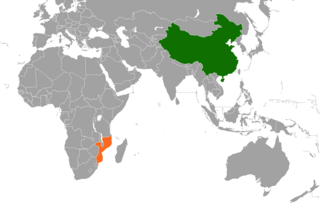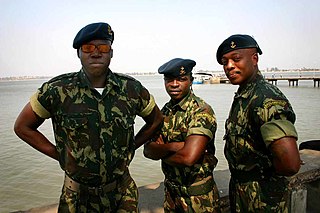
Mozambique, officially the Republic of Mozambique, is a country located in southeast Africa bordered by the Indian Ocean to the east, Tanzania to the north, Malawi and Zambia to the northwest, Zimbabwe to the west, and Eswatini and South Africa to the southwest. The sovereign state is separated from the Comoros, Mayotte and Madagascar by the Mozambique Channel to the east. The capital and largest city is Maputo.

The economy of Mozambique is $14.396 billion by gross domestic product as of 2018, and has developed since the end of the Mozambican Civil War (1977–1992). In 1987, the government embarked on a series of macroeconomic reforms, which were designed to stabilize the economy. These steps, combined with donor assistance and with political stability since the multi-party elections in 1994, have led to dramatic improvements in the country's growth rate. Inflation was brought to single digits during the late 1990s, although it returned to double digits in 2000–02. Fiscal reforms, including the introduction of a value-added tax and reform of the customs service, have improved the government's revenue collection abilities.
Global Affairs Canada is the department of the Government of Canada that manages Canada's diplomatic and consular relations, promotes Canadian international trade, and leads Canada's international development and humanitarian assistance. It is also responsible for maintaining Canadian government offices abroad with diplomatic and consular status on behalf of all government departments.

The foreign relations of Canada are Canada's relations with other governments and nations. Canada is recognized as a middle power for its role in global affairs with a tendency to pursue multilateral and international solutions. Canada is known for its strong commitment to international peace and security, as well as being a mediator in conflicts, and for providing aid to developing countries. The "golden age of Canadian diplomacy" refers to a period in Canadian history, typically considered to be the mid-20th century, when Canada experienced a high level of success in its foreign relations and diplomatic efforts.

The United Nations Operations in Mozambique was a UN peace mission to Mozambique established in December 1992 under Security Council Resolution 797 with the assignment to monitor the implementation of the Rome General Peace Accords agreed upon by the Mozambican president Joaquim Chissano of FRELIMO, the Front for Liberation of Mozambique, and Afonso Dhlakama of RENAMO, the Mozambican National Resistance. The operation was one of the most significant and extensive UN operations and it sought to demobilize and disarm troops, provide humanitarian aid, and oversee the elections. The operation ended in December 1994.
The Canadian International Development Agency was a federal Canadian organization that administered foreign aid programs in developing countries. The agency was merged into the Department of Foreign Affairs in 2013 by the federal government under Prime Minister Stephen Harper.
Aid effectiveness is the degree of success or failure of international aid. Concern with aid effectiveness might be at a high level of generality, or it might be more detailed.

Ivory Coast is one of the most pro-United States nations in Africa and the world, with 85% viewing the U.S. favorably in 2002, and rising to a high of 88% in 2007.

China–Mozambique relations date back to the 1960s, when China began to support the struggle of Mozambique's Marxist-oriented FRELIMO party against Portuguese colonialism. Diplomatic relations were formally established on 25 June 1975, soon after Mozambique gained independence from Portugal. In November 2006, Mozambique became the thirteenth African country to be added to China's official list of tourism destinations.

Mozambique – United States relations are bilateral relations between Mozambique and the United States.

Canada and Indonesia established diplomatic relations in 1952. Canada has an embassy in Jakarta while Indonesia maintains an embassy in Ottawa. Indonesia also has consulates in Toronto and Vancouver. Canada and Indonesia are partners in a number of multilateral organizations, such as Asia-Pacific Economic Cooperation (APEC), the G-20, Cairns Group, and the World Trade Organization (WTO).

Diplomatic relations between Canada and Haiti were established in 1954. During the unsettled period from 1957 to 1990, Canada received many Haitian refugees, who now form a significant minority in Quebec. Canada participated in various international interventions in Haiti between 1994 and 2004, and continues to provide substantial aid to Haiti. Both nations are members of the Organisation internationale de la Francophonie, Organization of American States and the United Nations, and are the only independent French-speaking countries in the Americas.

Canada and Mali established diplomatic relations in 1972. Mali has an embassy in Ottawa whilst Canada has an embassy in Bamako.
Canada-Asia relations are relations between Canada and Asian countries. These include bilateral relations between Canada and individual Asian states and multilateral relations through groups such as Asia-Pacific Economic Cooperation.

United Nations Security Council resolution 818, adopted unanimously on 14 April 1993, after reaffirming resolutions 782 (1992) and 797 (1992) on the situation in Mozambique, the Council stressed its concern regarding the delays and difficulties affecting the implementation of the peace process envisaged in the Rome General Peace Accords during the Mozambican Civil War.

United Nations Security Council resolution 850, adopted unanimously on 9 July 1993, after reaffirming resolutions 782 (1992), 797 (1992) and 818 (1993) on the situation in Mozambique, the Council discussed the implementation of the Rome General Peace Accords and the formation of a new armed forces in the country.

United Nations Security Council resolution 882, adopted unanimously on 5 November 1993, after reaffirming resolutions 782 (1992) and subsequent resolutions on Mozambique, the council noted, in addition to positive developments in the country, that some aspects of the Rome General Peace Accords had not been implemented.

Brazil–Mozambique relations are the bilateral relations between Brazil and Mozambique. Both nations are members of the Community of Portuguese Language Countries, Group of 77 and the United Nations.

Mozambique–Spain relations are the bilateral and diplomatic relations between these two countries. Mozambique has an embassy in Madrid. Spain has an embassy in Maputo.

South Korea and the countries that comprise Africa have a history of political, economic, militaristic, social, and cultural relations with one another since South Korea's establishment.

















